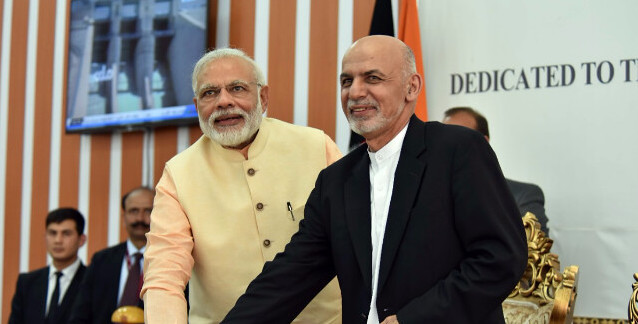Indian Boots on Ground in Afghanistan
September 4, 2019 | Expert Insights

Background
Afghanistan has become America's longest war where the US has lost over 2,400 soldiers since 2001 when it invaded the country after the 9/11 attacks.
It has cost the US exchequer a whopping $975 billion in Overseas Contingency Operations Fund, including estimates for 2019.
When you add the increase in the base budgets of Department of Defence and Department of Veteran Affairs--$250 billion and $50 billion respectively--the huge economic price being paid by US becomes apparent.
The cost of veterans’ medical and disability payments over the next 40 years will be more than $1 trillion, according to Linda Bilmes, a professor of public finance at Harvard’s Kennedy School of Government.
The burden of the war has largely been borne by the US with token participation by NATO and other allies. India, despite its growing strategic partnership with US, did not put any boots on the ground although it had a large economic and humanitarian footprint.
Sensing the mood of the nation, during his election campaign in 2016, Trump had pledged to end America's longest war and withdrawing US troops from Afghanistan.
As the next Presidential elections approach, President Trump wants to seek an honourable exit from Afghanistan thus fulfilling his election promise to the American people.
Analysis
“Countries like India, Iran, Russia and Turkey would have to fight against terrorists in Afghanistan at some point of time”, US President Donald Trump said on the eve of G7 summit, ruing that the job against terrorist is being done only by the United States some 7,000 miles away.
America’s current call for India, along with other countries, to help carry the burden of the Afghan conflict is not new, and in fact, was presented by both the Bush and Obama administrations as well.
The US is leading the Afghan peace process with the Taliban. The talks are centred around US promise to withdraw its troops from Afghanistan, in return for the guarantee by Taliban that the Afghan soil, would not become a platform for transnational terrorism. It is not clear whether any guarantees are being sought for the continuation of the current regime, once US departs. It can be assumed that the Taliban, and their Pakistani mentors, have waited patiently for nearly two decades to see the back of the Americans and now so close to their strategic objective of re-claiming Afghanistan, they are unlikely to brook any other form of interference.
India views Afghanistan as a key ally to counter the expanse of Chinese and Pakistani influence and maintain the regional balance of power. India has been a strategic partner of Afghanistan and has been investing heavily in development projects in Afghanistan.
Although India has advocated the Afghan cause for years and supported the Kabul government, it was largely non-committal to directly help its security and failed to build limited but the well-designed hard-power capacity to protect its interests. It relied on the US to win the war in Afghanistan, and do its national-security job as well. India’s reluctance also stems from the fact that terrorist groups such as the Haqqani network targeted its embassy in Kabul and its consulates in other parts of Afghanistan, which are directly linked to Pakistan-backed Taliban insurgents, who are aiming to unseat Afghan President Ashraf Ghani. Indian military presence would have exacerbated the security situation as India may not have been viewed as a neutral participant at par with NATO countries.
Following the revocation of Article 370 to end Indian-Administered Kashmir's special constitutional status, United States special representative to Afghanistan, Zalmay Khalilzad visited India and held discussion with External affairs Minister S. Jaishankar. The two leaders discussed how India and US could work effectively to ensure lasting peace in Afghanistan.
Counterpoint
Taliban has maintained that they are interested to hold a possible dialogue with India. Suhail Shaheen a part of its political office wrote on social media that they would like to discuss the points of agreement.
Assessment
- Trump’s statement can be viewed in the context of the larger geopolitical intrigues being played in the peace talks. Firstly, Islamabad may seek assurances from the US that Afghanistan soil will not be used to harbour anti-Pakistan actors. Secondly, it would ask India to deescalate tensions on the eastern Kashmir border.
- It is possible that tensions on Pakistan’s eastern border with India due to Kashmir have been cited for Pakistan not doing enough to speed up the peace talks. This has caused the all-round frustration.
- On its part, to ensure that India's interests are taken care of when US pulls out of the country, it has been hoping to coordinate its position with like-minded countries in the region.
- India would see no sense in getting involved in the Afghanistan quagmire at this belated stage when the US itself is exiting and the security situation in the countryside is deteriorating by the day, despite the talks.
- Afghanistan highlights India’s present inability to wield hard power in tandem with its soft power and be reckoned as a global power.
Read more
Image Courtesy: flickr.com








Comments